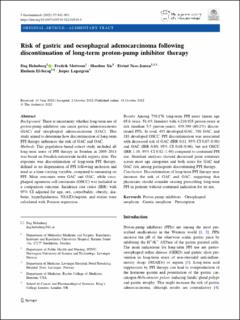Risk of gastric and oesophageal adenocarcinomas following discontinuation of long-term proton-pump inhibitor therapy
Holmberg, Dag; Mattsson, Fredrik; Xie, Shaohua; Ness-Jensen, Eivind; El-Serag, Hashem; Lagergren, Jesper
Peer reviewed, Journal article
Published version
Permanent lenke
https://hdl.handle.net/11250/3067978Utgivelsesdato
2022Metadata
Vis full innførselSamlinger
Sammendrag
Background
There is uncertainty whether long-term use of proton-pump inhibitors can cause gastric adenocarcinoma (GAC) and oesophageal adenocarcinoma (OAC). This study aimed to determine how discontinuation of long-term PPI therapy influences the risk of GAC and OAC.
Methods
This population-based cohort study included all long-term users of PPI therapy in Sweden in 2005–2018 was based on Swedish nationwide health registry data. The exposure was discontinuation of long-term PPI therapy, defined as no dispensation of PPI following inclusion and used as a time-varying variable, compared to remaining on PPI. Main outcomes were GAC and OAC, while oesophageal squamous cell carcinoma (OSCC) was included as a comparison outcome. Incidence rate ratios (IRR) with 95% CI adjusted for age, sex, comorbidity, obesity, diabetes, hyperlipidaemia, NSAIDs/aspirin, and statins were calculated with Poisson regression.
Results
Among 730,176 long-term PPI users (mean age 65.6 years, 58.4% females) with 4,210,925 person-years at risk (median 5.5 person-years), 439,390 (60.2%) discontinued PPIs. In total, 495 developed GAC, 598 OAC, and 188 developed OSCC. PPI discontinuation was associated with decreased risk of GAC (IRR 0.81, 95% CI 0.67–0.98) and OAC (IRR 0.80, 95% CI 0.68–0.96), but not OSCC (IRR 1.10, 95% CI 0.82–1.49) compared to continued PPI use. Stratified analyses showed decreased point estimates across most age categories and both sexes for GAC and OAC risk among participants discontinuing PPI therapy.
Conclusion
Discontinuation of long-term PPI therapy may decrease the risk of GAC and OAC, suggesting that physicians should consider ceasing prescribing long-term PPI in patients without continued indication for its use.

